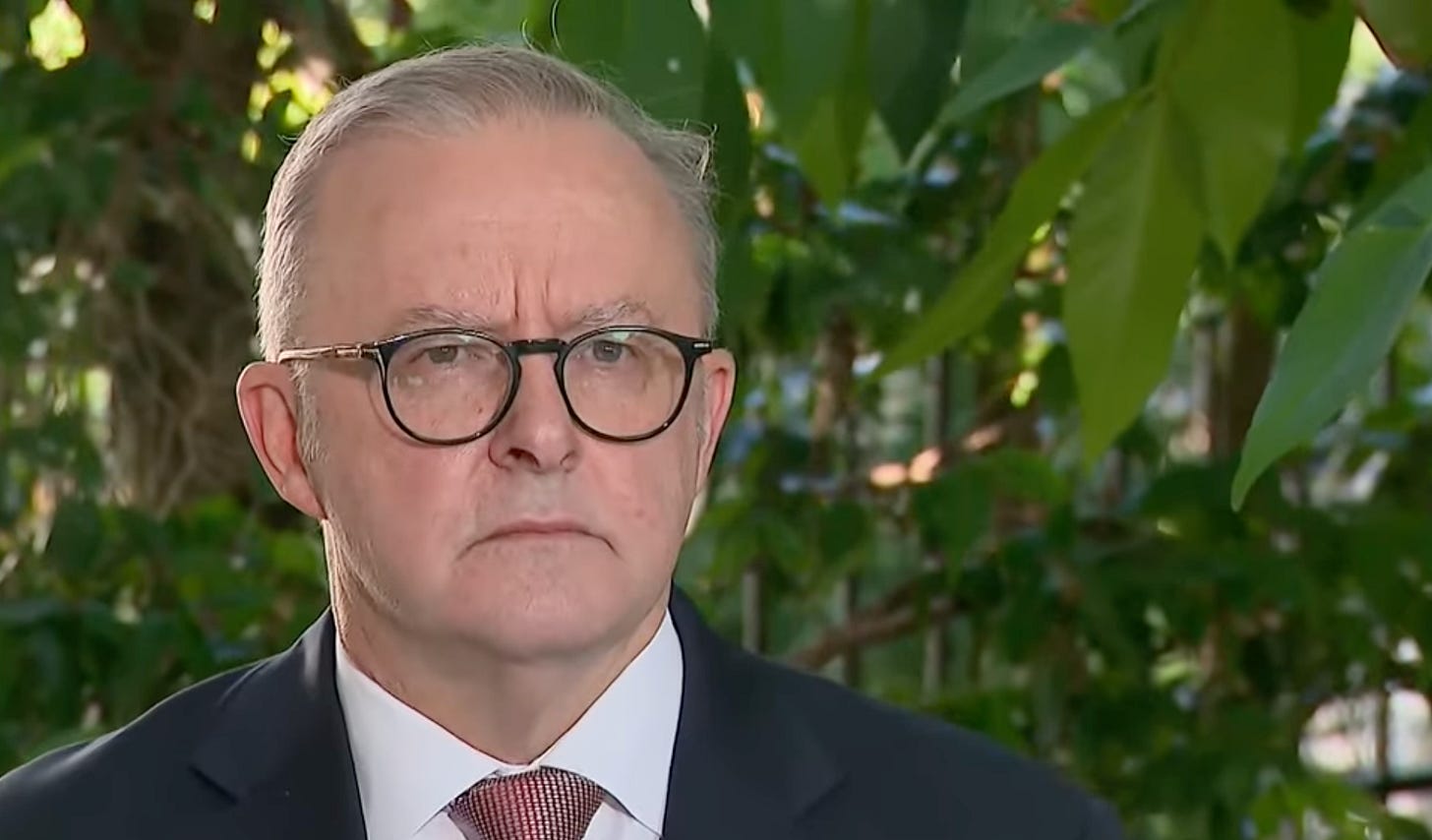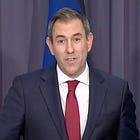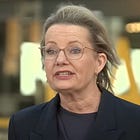Prime Minister Defends Palestinian Recognition, Cites Opposition's Past Support
Prime Minister Anthony Albanese defended his government's recognition of Palestinian statehood Thursday, dismissing Hamas statements as propaganda while highlighting the opposition leader's previous support for the same policy position.
Speaking from Brisbane, Albanese rejected criticism that his Monday announcement had emboldened Hamas, instead arguing the terrorist organization opposes the two-state solution his government supports.
"Hamas do not want a two-state solution. What they want is one state," Albanese told reporters. "What I say is that they shouldn't repeat Hamas' propaganda because it is Hamas which will engage in propaganda because they are being isolated."
The Prime Minister's comments came as Opposition Leader Susan Lee intensified her criticism of the Palestinian recognition decision, arguing it had given Hamas a "propaganda victory."
Albanese countered by quoting Lee's own past statements supporting Palestinian statehood, creating a direct confrontation over foreign policy consistency between the major parties.
Opposition Leader's Past Statements Highlighted
In a pointed response to his critics, Albanese cited extensive remarks Lee made previously advocating for Palestinian recognition, reading directly from her past statements during the press conference.
"I note that an opposition figure, the opposition leader had this to say in the past. She supported Palestinian statehood," Albanese said. "She said she supported Palestinian statehood, to quote her, because it will give heart to the ordinary people of the West Bank and Gaza."
The Prime Minister continued reading from Lee's previous statements: "We must stand in solidarity with those seeking the non-violent path to a secure Israel and an independent Palestine."
Albanese also quoted Lee as saying: "After two generations of strife and war, are we going to admit to our children that their parents could not even find a path to peace? Or worse still, that we didn't even try."
These citations appeared designed to highlight what the government sees as inconsistency in the opposition's current criticism of a policy position Lee had previously endorsed.
Hamas Propaganda Claims Disputed
The Prime Minister specifically addressed claims about Hamas statements supporting Australia's decision, suggesting recent comments attributed to the organization may not be authentic.
"I notice in the statement that's made today, they say that the alleged statement from the person yesterday is someone who's been in prison in Israel since October 2023 and has no means of communication," Albanese said.
He used this to warn media outlets against amplifying what he characterized as Hamas propaganda efforts.
"What that should be a warning to the media of being very careful about the fact that Hamas will engage in propaganda because what is happening is the international community are united about isolating Hamas, about supporting a peaceful way forward," Albanese said.
The Prime Minister emphasized his government's opposition to Hamas while defending the broader policy of Palestinian recognition.
"So I won't be a cheer squad for Hamas and for its statements," Albanese said. "What I'll do is say that Hamas should be isolated and everyone in political life in Australia should be a part of that."
International Community Support Cited
Albanese positioned Australia's decision within broader international momentum toward Palestinian recognition, citing support from traditional allies and international organizations.
"There's 147 countries have already recognised Palestine," Albanese said. "A range of countries in the West, like-minded countries, the United Kingdom, Germany, Malta, Italy are making statements."
He specifically mentioned countries that have indicated support for a two-state solution approach.
"Some of those countries, like the United Kingdom, France and Canada, have made it clear that they want to see a path forward of a two-state solution," Albanese said.
The Prime Minister argued that continuing the status quo was not sustainable given decades of conflict in the region.
"We are seeing the alternative play out as it has been for 77 years," Albanese said. "And the international community are saying enough is enough."
Truth matters. Quality journalism costs.
Your subscription to The Evening Post (Australia) directly funds the investigative reporting our democracy needs. For less than a coffee per week, you enable our journalists to uncover stories that powerful interests would rather keep hidden. There is no corporate influence involved. No compromises. Just honest journalism when we need it most.
Not ready to be paid subscribe, but appreciate the newsletter ? Grab us a beer or snag the exclusive ad spot at the top of next week's newsletter.
Gaza Situation and Path Forward
Albanese outlined his government's vision for resolving the ongoing conflict, emphasizing the need for Hamas isolation while providing hope for Palestinian civilians.
"Hamas must be isolated. We must find a way in which Israel can have security," Albanese said. "That is through a recognition by all the states around it of its right to continue to exist as a majority Jewish state going forward."
He argued that Palestinians also deserved reasonable expectations for their future, suggesting the current situation in Gaza was unsustainable.
"People who look at Gaza can't just continue to say, we'll just keep doing more of the same. We'll keep having more attacks," Albanese said. "The hostages haven't been released. We need to isolate Hamas, but we do need to find a way forward."
The Prime Minister connected current circumstances to broader generational impacts of the conflict.
"What the international community is saying, now that there are three generations of people who have suffered from conflict in the Middle East, both Israeli and Palestinian, that we need to find a path to peace," Albanese said. "And a path to peace is through a two-state solution."
Arab League Support Referenced
When questioned about Arab countries' willingness to address Hamas, Albanese pointed to recent statements from regional organizations.
"The Arab League have stepped up. They made a very clear statement," Albanese said. "And the Arab countries in the region have stepped up. Their statement was historic, that they made weeks ago, and people who followed this debate know how significant that statement was."
This reference appeared aimed at demonstrating regional support for international efforts to isolate Hamas while advancing peace prospects.
Productivity Roundtable Defense
Albanese also addressed opposition criticism of the upcoming Productivity Roundtable, rejecting claims that outcomes had been predetermined based on leaked Treasury documents.
"Not at all. You'd expect Treasury to be giving advice about a forum that's about the economy," Albanese said when asked if the roundtable was a waste of time.
The Prime Minister described extensive consultation processes leading up to the main event.
"What is happening in the lead-up, there's been 41 different roundtables. Ideas are popping up all of the time," Albanese said. "You're reporting on those ideas. Those ideas are getting assessed as they're being made."
He emphasized that while Treasury provides advice, government retains decision-making authority.
"I mean, government will make decisions. To be very clear, governments make decisions," Albanese said. "What next week, though, is an opportunity for people to advance their ideas, to advance policies. And that's a really constructive thing."
Government Consultation Approach
Albanese positioned his administration as actively seeking input from various stakeholders, describing this as a defining characteristic of his government's approach.
"My government is unashamedly an open government," Albanese said. "We're a government that wants to hear from people, that wants to engage with people. We're an inclusive government."
He said business community engagement had been particularly active in recent weeks.
"I've had a number of meetings with the business community myself in the last week in which ideas have been put forward, and they're very welcome," Albanese said.
When pressed about the scope of potential reforms, Albanese avoided specific commitments while indicating openness to various approaches.
"We're up for a range of reforms, but those decisions, of course, are up for government," Albanese said.
Timeline for Policy Implementation
The Prime Minister outlined how different proposals might be implemented across various timeframes, suggesting a structured approach to policy development.
"There'll be some things that are put forward that can be done immediately. Some things can be the result of legislation," Albanese said. "Some things will feed into next year's budget. Some things will feed into future commitments about future terms."
He indicated decisions would emerge through normal government processes following the roundtable discussions.
"Ideas will then come through normal government processes. That's how good policy happens," Albanese said.
Economic Context and Priorities
Albanese opened his remarks by highlighting current economic indicators, positioning them within his government's cost-of-living focus.
"Real wages increasing, unemployment low, the economy continuing to grow, all meaning a difference for what is our number one priority, which is cost of living," Albanese said.
This framing appeared designed to provide context for the productivity discussions and demonstrate government economic management.
Approach to Policy Development
The Prime Minister rejected what he characterized as demands for immediate policy positions on proposals that emerge from consultations.
"We're not playing this game," Albanese said when asked about specific National Construction Code changes. "There's a meeting next week. We'll hear from ideas coming forward and ideas are a good thing and we should encourage them."
He described a pattern where government openness to ideas creates expectations for immediate policy commitments.
"One of the things that happens is that there are various editorials that will be written that say government should be up for ideas and as soon as ideas are put forward, by anyone, you're asked, is that government policy, is it not?" Albanese said.
The Prime Minister distinguished between campaign commitments and ongoing policy consideration.
"Well, no, government policy is what we took to the election. But we're up for ideas, we're up for consideration of things that are put forward," Albanese said.
Leadership Philosophy
Albanese referenced what he described as a historical quote to explain his government's consultative approach to policy development.
"I've quoted what is, I think, a pretty good quote historically, which is, if you think you're the smartest in the room, you're in the wrong room," Albanese said. "We want to open things up. We want to hear from people."
This philosophy appeared central to his defense of the roundtable process against opposition criticism about predetermined outcomes.
Media and Documentation Questions
When pressed about leaked Treasury documents suggesting pre-written outcomes, Albanese emphasized the distinction between advice and final decisions.
"Well, nothing's been proposed. Governments decide things. Let's be very clear. Governments decide," Albanese said. "There's no cabinet documents out there. There's no cabinet proposals. We're awaiting the forum."
This response aimed to clarify that Treasury advice and assessment of ideas does not constitute predetermined government policy.
Openness to Input
The Prime Minister concluded by inviting continued engagement from various stakeholders, including media representatives present at the press conference.
"Any ideas that you have for reform, we're happy to hear as well," Albanese told reporters.
This comment reinforced his administration's positioning as open to consultation across the political spectrum.
Opposition Dynamics and Policy Consistency
Throughout his remarks, Albanese appeared focused on highlighting what he characterized as opposition inconsistency, particularly on Palestinian recognition policy.
By extensively quoting Lee's previous statements supporting Palestinian statehood, the Prime Minister sought to undermine current opposition criticism of his government's decision.
The strategy appeared designed to shift focus from Hamas reactions to the policy decision toward questions about opposition credibility and consistency on foreign policy matters.
International Isolation of Hamas
Albanese repeatedly emphasized international consensus around isolating Hamas while pursuing peaceful resolution of the broader conflict.
"The world is horrified by the events of October 7 and the world condemns and says, including the Arab League, has said that Hamas must be isolated, it must be disarmed, the hostages should be released and have condemned what occurred on October 7," Albanese said.
This positioning sought to demonstrate that Palestinian recognition aligned with, rather than contradicted, international efforts to marginalize Hamas and advance peace prospects.
Economic Policy Process
The Prime Minister's defense of the Productivity Roundtable process reflected broader themes about his government's approach to economic policy development.
By describing 41 preliminary roundtables and ongoing idea assessment, Albanese portrayed the main event as the culmination of extensive consultation rather than a predetermined exercise.
"Ideas are popping up all of the time. You're reporting on those ideas. Those ideas are getting assessed as they're being made," Albanese said.
This description aimed to counter opposition claims that the roundtable represented a "stitch up" with predetermined outcomes.
Future Policy Direction
While avoiding specific commitments, Albanese indicated his government's willingness to consider substantial changes emerging from the consultation process.
"We don't want to have a rule-in, rule-out game," Albanese said, suggesting flexibility in approaching reform proposals.
However, he maintained that final decisions would follow established government processes rather than being announced directly from the roundtable itself.
The Prime Minister's comprehensive response to multiple policy criticisms reflected efforts to maintain government momentum while addressing opposition attacks across both domestic and international policy areas.
His strategy of citing the opposition leader's past positions on Palestinian statehood appeared designed to shift political dynamics around the foreign policy debate while defending his administration's broader consultative approach to governance.
The Brisbane press conference demonstrated the Prime Minister's efforts to position his government as both internationally aligned and domestically consultative, while characterizing opposition criticism as inconsistent with their own previous positions and statements.
Conclusion and Forward Look
Albanese's remarks reflected a government seeking to maintain policy initiative while responding to sustained opposition criticism across multiple fronts.
By combining defense of specific decisions with broader arguments about consultation and international alignment, the Prime Minister appeared focused on preserving political momentum for his administration's agenda.
The extensive citation of opposition leader statements suggested a strategic effort to shift debate terms from government policy justification toward questions about opposition consistency and credibility.
Got a News Tip?
Contact our editor via Proton Mail encrypted, X Direct Message, LinkedIn, or email. You can securely message him on Signal by using his username, Miko Santos.
As well as knowing you’re keeping Mencari (Australia) alive, you’ll also get:
Get breaking news AS IT HAPPENS - Gain instant access to our real-time coverage and analysis when major stories break, keeping you ahead of the curve
Unlock our COMPLETE content library - Enjoy unlimited access to every newsletter, podcast episode, and exclusive archive—all seamlessly available in your favorite podcast apps.
Join the conversation that matters - Be part of our vibrant community with full commenting privileges on all content, directly supporting The Evening Post (Australia)
Not ready to be paid subscribe, but appreciate the newsletter ? Grab us a beer or snag the exclusive ad spot at the top of next week's newsletter.










